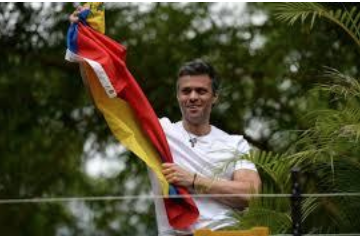Venezuelan opposition figure Leopoldo López’s July 8 transfer to house arrest—following more than three years in military prison—was accompanied by a flurry of speculation among Venezuela analysts over the motivations and meaning of the move. While interpretations varied, one thing remains clear: transferring Lopez to house arrest was not, as the government has insisted, merely a procedural matter that illustrates the health of checks and balances in Venezuela.
For Venezuelan pollster and political analyst Luis Vicente Leon, the move is an effort by the Maduro government to “lower the pressure” it has felt from the international community, the opposition, and from Chavistas themselves in the wake of the widely condemned July 4 attack on the National Assembly. As evidence of this, he also points to the Supreme Court’s delay in deciding whether to move forward a trial against Attorney General Luisa Ortega, as well as the court’s silence on a pending appeal of Henrique Capriles’ ban on holding public office. These, suggests Leon, could be part of the government’s attempt at jump-starting renewed talks with the opposition Democratic Unity Roundtable (MUD), although he is skeptical that this will result in the kind of meaningful negotiations the opposition is seeking.
Another interpretation, from David Smilde, is that the Lopez move may actually make it easier for the government to remove Luisa Ortega from office. Since Ortega was responsible for Lopez’s prosecution for allegedly inciting violence in the 2014 wave of protests, her ouster would allow Maduro to distance itself from Lopez’s jailing, while simultaneously ridding itself of a meddlesome critic in the Attorney General’s Office. In turn, this would also allow the Maduro government to respond to criticism of Ortega’s sacking by pointing to its adherence to the Supreme Court’s Lopez decision out of respect for the “autonomy” for the court.
Other analysts have focused on the involvement of former Spanish Prime Minister José Luis Rodríguez Zapatero, as well as the other two ex-presidents involved in UNASUR-supported talks that began last year. Opposition blogger Francisco Toro was one of the early observers to point to Zapatero’s role in the Lopez transfer, and questioned whether this heralded the emergence of further government concessions like the suspension of the Constituent Assembly initiative in exchange for a break in the more than 100 days of recent protests.
The government did release National Assembly Deputy William Azuaje for home arrest yesterday. Nevertheless, the government, meanwhile, appears to be moving full speed ahead with the July 30 election of representatives to the Constituent Assembly. Electoral officials have published a list of candidates, and announced plans to hold a practice run of the vote on the same day that the MUD is holding an unofficial referendum on Maduro’s plan to alter the 1999 Constitution.
For its part, on July 10, the opposition organized a ten hour “shutdown,” blocking major roads in Caracas and various points in major cities around the country for several hours, showing no willingness to discourage protests.
A separate, more cynical explanation for Lopez’s transfer has also been put forward in recent days. Because Capriles and Lopez have long been rivals in the opposition, some have speculated that the move is an attempt to foment disarray and disorganization inside the MUD. One Venezuela journalist even called López’s release “poisoned candy.” While Lopez has been barred from office and is not allowed to speak to journalists while under house arrest, his political ambitions have not faded: his family says he has met with members of his Voluntad Popular party since his release.
Others in the MUD, including Capriles and MUD spokesman Jesús “Chúo” Torrealba, have congratulated Lopez and supported his released, but it remains unclear how his release will affect opposition dynamics. In a potential nudge at Lopez’s past support for a more confrontational approach to the government, Torrealba told BBC Mundo he believed Lopez was more “statesmanlike” since his release and that this is what the opposition needed, rather than what he called a “messiah.”
The MUD spokesman also acknowledged Lopez’s broad popular support while encouraging a shift from past rhetoric, saying: “Probably what this country is hoping for from Leopoldo Lopez […] is not calls for a march. It is hoping for a leader that can use action and discourse to unlock the Venezuelan political crisis and allow us not to witness an ending, but to build a transition.”
So far it is not clear how active López will be given limits put on speech during home arrest—he apparently cannot tweet or do one-on-one interviews with journalists. With others such as Antonio Ledezma, this has effectively withdrawn them from Venezuela’s public sphere. López has not tweeted in over a month and has only made statements through his wife Lilian Tintori. But he has been able to talk to a number of politicians who also transmit his message.



